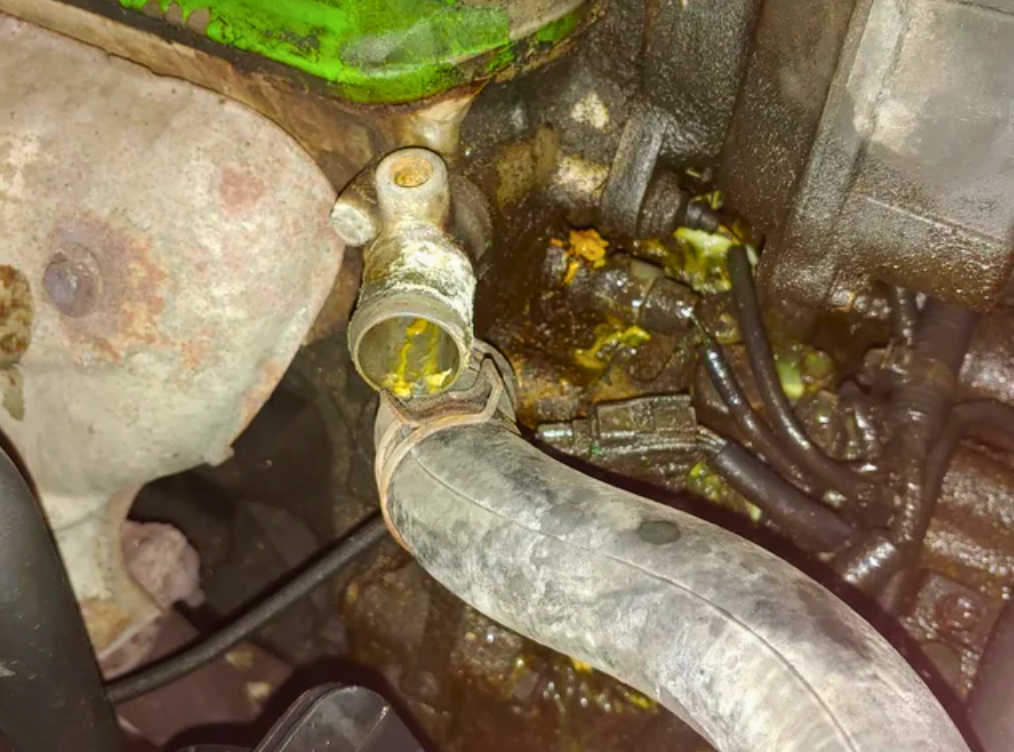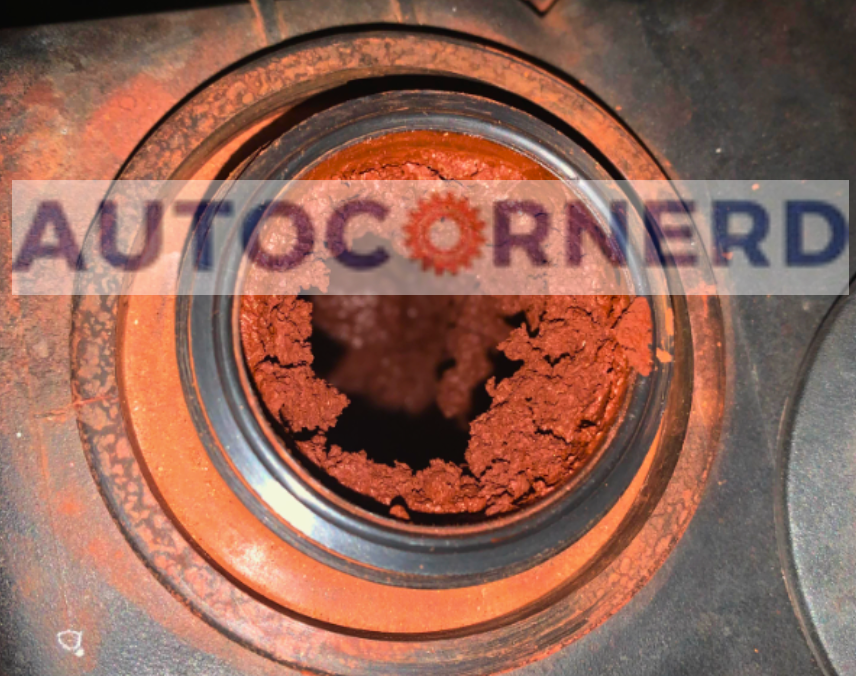Has Anyone Tried Putting An Egg In Their Radiator to Stop a Coolant Leak? Worried It Might Cause More Problems.
What is egg in radiator trick? The egg in radiator trick involves adding egg protein to a leaky radiator, hoping coagulation seals cracks temporarily. Pressure pushes egg towards holes in radiator where it may lodge, slowing coolant loss until proper repairs. While unorthodox, it can provide emergency DIY relief. Egg in the Radiator trick is not a long-term solution and should be used as a temporary fix until a proper repair can be made. Using egg as a long-term solution for coolant leak will clog the cooling system, and will cause engine overheating.
Got a pesky coolant leak but don’t want to pay the high cost of repairs? Using an egg may seem like a strange quick fix, but this clever trick can temporarily plug small holes in your radiator long enough to get you down the road. In this guide, we’ll explain how it works.

Sometimes, check engine light also comes on after coolant change. If it happens with you, you can read my guide on that topic.
- The egg in radiator trick involves adding raw egg to a radiator with a small coolant leak. The heat from the engine causes the egg proteins to coagulate and form a temporary seal around the leak.
- When egg is added to hot coolant, the proteins denature and clump together due to heat, becoming sticky and plugging small cracks or holes to stop coolant loss.
- While it can help as an emergency fix, egg can contaminate the cooling system over time. It’s also not a permanent solution and the seal may break down, requiring proper repair.
- Other items like pepper, cinnamon or coolant sealants can also be used in some cases, but only very minor leaks can be plugged this way. Real fixes involve repairing or replacing damaged radiator parts.
- The goal is to buy time until professional repairs can be made – these tricks aren’t a substitute for proper maintenance to prevent long-term issues like overheating.
Importance Of Fixing Coolant Leaks In A Vehicle
Coolant is a liquid mix of half water and half antifreeze that flows through the engine and radiator. This keeps the engine at the right temperature.
Coolant stops the engine from overheating. It also protects against rust, corrosion, and scale in the engine.
If there’s not enough coolant, the engine can overheat. This can badly damage the cylinder head, pistons, valves, gaskets, and other parts. An overheated engine also lowers fuel economy, power, and emissions.
Let’s look at why fixing coolant leaks matters:
1. Preventing Engine Damage
Like we just discussed, a leak and overheating can seriously ruin an engine.
When overheated, the metal parts expand, warp, or move out of place.
This can permanently damage the engine. You may need a full replacement.
2. Protecting Other Parts
Coolant leaks affect more than just the engine. The radiator, water pump, and heater core need coolant too.
With less coolant from a leak, these parts lose efficiency or fail.
Low coolant causes cavitation in water pumps. This damages them and the engine overheats. Fixing leaks ensures these key parts last.
If you have FORD vehicle and experiencing coolant overtemperature issue, you can read my guide on that topic.
3. Preventing Corrosion
Coolant controls temperature and has additives against corrosion. This includes the radiator.
But leaks lower coolant levels. That exposes the engine to corrosion. This can cause rust.
Rust severely hurts performance and lifespan of engine parts.
If you don’t check the radiator and cap after miles, rust builds up inside. This affects coolant flow and causes overheating.

4. Reduced Fuel Mileage
An engine not at the right temperature may use more fuel.
A radiator leak makes the engine run hotter than normal. The metal parts expand and cause more friction.
So the engine works harder to keep speed and power. It burns more fuel to do this.
Overheating from leaks lowers compression ratio and power. It raises oil use. This happens because head gaskets can blow from overheating and lose compression.
Also, high engine temps from a leak make the coolant sensor send signals. The ECU then injects less fuel to cool the engine down. This makes the air-fuel mixture too lean. It affects MPG due to bad combustion.
Lastly, a coolant leak can gunk up the oxygen sensor. This also impacts fuel economy.
What Causes Coolant Leaks?
Coolant leaks can leave you stranded, so knowing the common causes can help you make repairs quickly. Let’s walk through the main places to check if you see your coolant level dropping.
- First, take a peek under the hood. Radiator hoses transport hot coolant between the radiator and engine. As they age, hoses can crack or split from the pressure and heat. Loose hose clamps are another obvious culprit—they can wiggle loose over time. Give them a check to make sure the rubber hoses have a tight seal on the fittings.
- While you’re looking around, check that water pump. It constantly pumps the coolant, so the pump’s seals and gaskets wear out eventually. Watch for leaks around the pump housing.
- Nearby is the thermostat housing—that little metal or plastic case holding the thermostat valve. It controls coolant flow based on engine temperature. The housing seal and flange can fail, so inspect this area too.
- Now let’s move to the inside. The heater core is like a mini radiator that warms your cabin. It’s prone to corrosion and clogs which can cause leaks.
- Back under the hood, examine the radiator and cap. The radiator can leak from corrosion or damage due to impact. Ensure the radiator cap is tight—it maintains system pressure. Replace if faulty.
- One sneaky coolant culprit is the head gasket between the cylinder head and engine block. If it fails, coolant can enter the cylinders unseen. Watch for white exhaust smoke or milky oil.
Why Does Radiator Leak?
Here are four reasons a radiator may spring a leak:
- Over time, parts of the radiator can wear out. Air, moisture and gunk in the liquid can make the metal rust. This corrosion weakens the radiator. Small holes and cracks appear. Liquid then sneaks out through those openings.
- A hard knock can also cause a radiator leak. Debris on the road may hit the radiator. Or the radiator may get damaged in a crash. Dents and punctures let the liquid escape. So it’s smart to check for any visible damage.
- Too much pressure can burst the radiator, too. This can happen if the radiator cap malfunctions. Or if the pressure release valve in radiator cap fails. Too much pressure pushes past what the radiator can handle. When this happens, cracks and ruptures open up and leak liquid. Making sure the cap and valve work right prevents this.
- Rarely, a flaw in the manufacturing can lead to leaks. Weak spots, bad welds or low-grade materials may get used. These defects can allow liquid to seep out.
The Science Behind the Egg In Radiator Trick
Fixing a radiator leak with an egg is like putting a bandaid on a big ouchie. It sorta works for a bit, but probably won’t last forever. Let’s learn why eggs can gum up leaks temporarily.
Eggs have special proteins that help baby chicks grow big and strong. But when eggs get too hot, like in a steaming radiator, the proteins freak out. They go from nice and tidy to tangled up in knots. We call this denatured. Denatured proteins turn into a gooey mess.
The proteins in an egg white and yolk denature at about 180°F. That’s around the normal temperature inside your car’s radiator. So if you crack an egg and pour it in the radiator, the proteins will denature from the heat. They’ll turn from a liquid to a sticky glob of goo.
This goo blobs up around the leak as it flows through the radiator. It tries its best to plug up the hole, like putty. This sticky seal reduces more coolant from leaking out. So your car can keep going until you get a real fix.
The egg trick buys you some time. But it’s not a forever solution for a busted radiator. The goopy seal might break down as the radiator heats and cools. But in a pinch, it can get you to the autoshop for a proper patch job.
Potential Limitations and Risks of Using Egg In Radiator Trick
The egg in radiator trick can keep your car going for a little while longer, but you need to know what it can and can’t do. Here are some key points to think about:
1. The egg can make a mess.
Dumping raw egg into the radiator can leave gunk that clogs up your cooling system. Bits of egg can get stuck in the radiator tubes, thermostat, and other parts. This blocks the flow of coolant and hurts how well the system works. Over time, it can lead to overheating issues.
2. The egg covers up the real problem.
Using egg seals leaks temporarily. But it doesn’t show you where exactly the radiator is leaking. Finding the source of the leak and fixing it properly is important. The egg trick can delay the repairs you really need.
3. The egg doesn’t last forever.
The egg seals radiator leaks for a short time. But the constant heat, pressure, and vibration in the cooling system breaks down the egg. Eventually, the leak can come back. To reliably fix it long-term, the radiator needs professional repair.
What About Pepper For Radiator Leak?
Pepper is a woody cellulose chunk that softens up and swells to fill a pinhole leak or ultrafine crack in the radiator and its hoses.
The principle behind using pepper for radiator leak is simple: when black pepper is introduced into the coolant system, it doesn’t dissolve in a water-coolant solution. Instead, the small particles travel to the leak where they expand and seal the gap.
The pepper does not deteriorate and will keep the leak plugged until you can get it fixed by a professional.
Pepper is not the only spice that can work as a temporary fix for radiator leaks. Other spices that have similar properties include cinnamon, nutmeg, cloves, ginger and turmeric. However, pepper is the most commonly used and readily available one.
Note: Make sure that you only put grounded black pepper in the radiator. Putting the peppercorns in the radiator will clog up the thermostat, and set the thermostat in either stuck opened or stuck closed condition.
The disadvantage of using pepper to stop radiator leak is that pepper can only seal pinhead-sized leaks or hairline cracks in your radiator.
Other Tricks For Coolant Leaks in Radiator
Temporary sealants like AlumAseal or Bars Leaks Pellets can be effective in stopping minor leaks from radiator temporarily. These products work by forming a seal around the leak, preventing coolant from escaping.
However, it is essential to remember that they are not permanent fixes and should be considered as temporary measures until a proper repair can be conducted.
